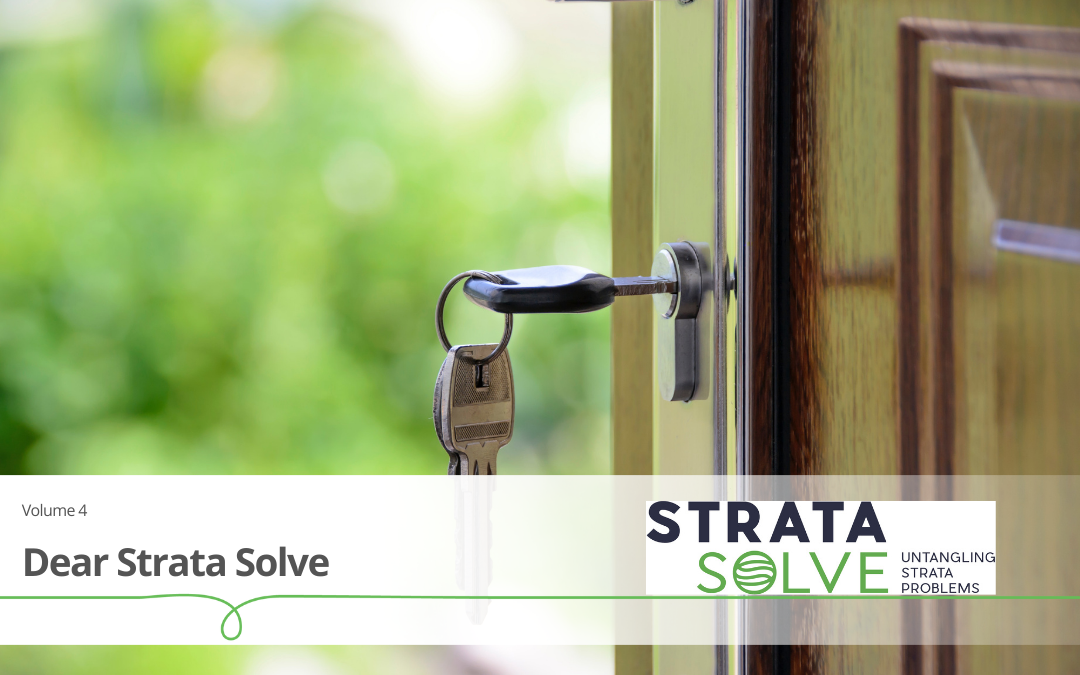Welcome to our exclusive column by Chris Irons, Dear Strata Solve, untangling your strata problems.
Volume 4
Dear Strata Solve
I know that someone’s home is their castle, but surely the body corporate has the ability to enter that ‘castle’ if there is a real need to? We have a lot owner that won’t allow the committee’s contractor onto the lot to check on some critical utility infrastructure. They say it will happen over their dead body! How can we properly negotiate a smooth entry to their premises?
Frustrated in Ferny Grove
Dear Frustrated
Yes, a person’s home is their castle. That said, when that castle is part of a broader community of castles in a strata scheme, those rights are modified. And that means that a body corporate can, indeed must, enter someone’s lot under certain circumstances – and they don’t need consent or permission to do so.
Section 163 of the Body Corporate and Community Management Act 1997 provides for that power, utilised in two broad instances: emergency, and more routine instances. In those routine instances, provided the body corporate has provided the appropriate written notice (at least 7 days, including details of why the entry is needed and who will be attending, such as the contractor’s details), the power of entry may be used. The power should only be used where it is ‘reasonably necessary’:
- to inspect the lot or common property and find out whether work the body corporate is authorised or required to carry out is necessary; or
- to carry out work the body corporate is authorised or required to carry out.
In an emergency, the power of entry might be more pressing and as such, notice is not necessarily needed at all. That said, the legislation does not define what an ‘emergency’ is and it stands to reason it would be an exceptional, unexpected set of circumstances where there is a genuine and urgent issue.
The legislation makes no reference to the owner of the lot needing to approve the entry by the body corporate or its authorised person or contractor, something which in our experience is a common misconception. Emhpasising this point, the legislation also provides that it is an offence to obstruct the proper use of the power of entry, with a financial penalty of over $3,000 applicable. It is one of the few instances in strata legislation where such a financial penalty exists. Strata Solve is aware of instances where Police have been called upon to facilitate the body corporate’s proper use of power or entry.
We understand that a lot owner might baulk at the idea the body corporate can enter their lot in these ways. That said, that power is not unlimited and there is certainly no option for, say, the chairperson to simply wander into a lot, unannounced, because a the feel that something might be amiss. Process must be followed, unless it is a genuine emergency. It stands to reason that a committee would work with an owner, if there are a circumstances where the committee feels it is necessary to enter a lot, making sure the lot owner knows why the entry should occur. Committees can make the process easier by ensuring that ‘why’ question is clearly answered and perhaps also pointing out the benefits for the lot owner (e.g., to perform works that are going to benefit the lot owner in the long run).
Even so, the need to negotiate with an owner for proper power of entry may be taking that a step too far. In other words, if the body corporate genuinely needs to enter a lot, it can – and should.
Got a question for Dear Strata Solve or want to know how Strata Solve can assist? Contact us here.
